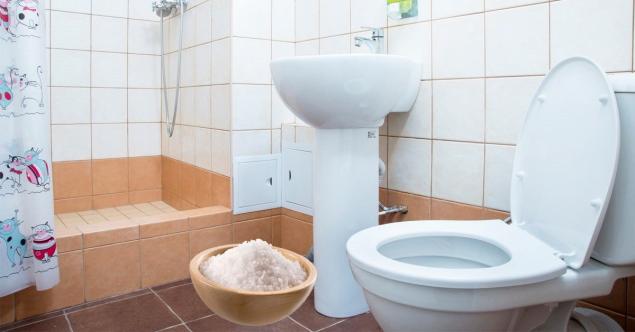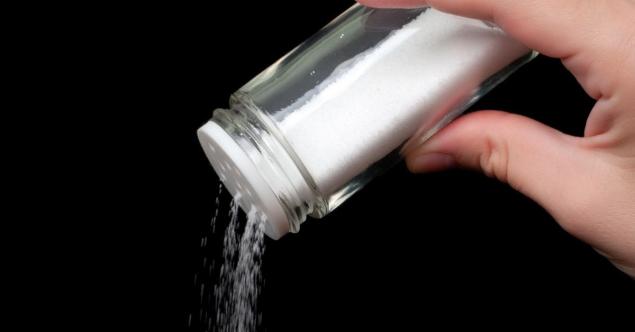196
Why do the Japanese put salt in the toilet and why should we?
The Japanese have a reputation for being unusual but very intelligent. Thanks to the amazing organization, the inhabitants of the Land of the Rising Sun have achieved high results in various spheres of life. Therefore, the peculiarities of their life are always interesting to learn something new.
And today's edition. "Site" They will talk about how salt is treated in Japan. This product in the island country is endowed with simply mystical qualities and used in the most unpredictable places. The Japanese often scatter saltIn the corners of the living room and even in the toilet. Why do these smart people do such strange things?

Salt in the house Popular seasoning is respected in different parts of the world. But in Japan, they are quite sure that with the help of salt you can not only manage in the kitchen, but also scare away evil spirits and attract luck.

When conducting cleansing ceremonies, when the Japanese are trying to get rid of bad energy and neutralize the tricks of evil spirits, they necessarily use salt. Even during the memorial service, a vessel with this seasoning is put on the altar.
Without small crystals can not do and the fights of sumoists, because in the ring it is previously customary to sprinkle salt. It is scattered at the entrance to restaurants, bars, cafes or entertainment venues, as it is believed that salt attracts customers. And at the threshold, “white gold” not only helps to cleanse the energy sector, but also relieves everyone who enters the house from bad thoughts.

It is especially surprising that in toilets and bathrooms, the Japanese can not do without salt. Locals believe that through vents and opening windows here can penetrate evil spirits. Therefore, housing can be protected only with the help of the same popular seasoning.
Spread salt around the corners It is not beautiful, and it is hardly permissible for such aesthetics as the inhabitants of the Land of the Rising Sun. Therefore, the seasoning is poured into plates, which are placed in the right places. Often, multifaceted pyramids are made of salt (most often trihedral) or figurines are built that can protect and decorate the space.

As for the Japanese belief that salt is capable of attracting customers, it is related to this. legend.
It is rumored that the emperor of Kyoto, who ruled fifteen hundred years ago, had a huge harem of 3 thousand women. Choosing the one he would spend the night with wasn’t easy. Therefore, he entrusted the horse with the choice: to the threshold of which girl a faithful friend of the monarch will approach, he will be lucky.

And in order to more often enjoy the attention of the emperor, one beautiful woman went to the trick, spilling salt on her doorstep. Wanting to taste his favorite delicacy, the horse each time went to the threshold of this resourceful woman, bringing with him the ruler. Since then, the Japanese have believed that salt out It is to attract the right people, luck and money to your home.

It is amazing to learn how the rapid development of new technologies and the creation of robots in Japan is combined with a belief in the extraordinary abilities of the most familiar things, even products. From the outside, it looks more like respect for ancient traditions. Is it worth sprinkling salt everywhere? It's everyone's choice. We also have traditions to honor.
And today's edition. "Site" They will talk about how salt is treated in Japan. This product in the island country is endowed with simply mystical qualities and used in the most unpredictable places. The Japanese often scatter saltIn the corners of the living room and even in the toilet. Why do these smart people do such strange things?

Salt in the house Popular seasoning is respected in different parts of the world. But in Japan, they are quite sure that with the help of salt you can not only manage in the kitchen, but also scare away evil spirits and attract luck.

When conducting cleansing ceremonies, when the Japanese are trying to get rid of bad energy and neutralize the tricks of evil spirits, they necessarily use salt. Even during the memorial service, a vessel with this seasoning is put on the altar.
Without small crystals can not do and the fights of sumoists, because in the ring it is previously customary to sprinkle salt. It is scattered at the entrance to restaurants, bars, cafes or entertainment venues, as it is believed that salt attracts customers. And at the threshold, “white gold” not only helps to cleanse the energy sector, but also relieves everyone who enters the house from bad thoughts.

It is especially surprising that in toilets and bathrooms, the Japanese can not do without salt. Locals believe that through vents and opening windows here can penetrate evil spirits. Therefore, housing can be protected only with the help of the same popular seasoning.
Spread salt around the corners It is not beautiful, and it is hardly permissible for such aesthetics as the inhabitants of the Land of the Rising Sun. Therefore, the seasoning is poured into plates, which are placed in the right places. Often, multifaceted pyramids are made of salt (most often trihedral) or figurines are built that can protect and decorate the space.

As for the Japanese belief that salt is capable of attracting customers, it is related to this. legend.
It is rumored that the emperor of Kyoto, who ruled fifteen hundred years ago, had a huge harem of 3 thousand women. Choosing the one he would spend the night with wasn’t easy. Therefore, he entrusted the horse with the choice: to the threshold of which girl a faithful friend of the monarch will approach, he will be lucky.

And in order to more often enjoy the attention of the emperor, one beautiful woman went to the trick, spilling salt on her doorstep. Wanting to taste his favorite delicacy, the horse each time went to the threshold of this resourceful woman, bringing with him the ruler. Since then, the Japanese have believed that salt out It is to attract the right people, luck and money to your home.

It is amazing to learn how the rapid development of new technologies and the creation of robots in Japan is combined with a belief in the extraordinary abilities of the most familiar things, even products. From the outside, it looks more like respect for ancient traditions. Is it worth sprinkling salt everywhere? It's everyone's choice. We also have traditions to honor.
Why you should cook cheesecake according to a German recipe
The Little Wisdoms of Cleaning the Bathroom























